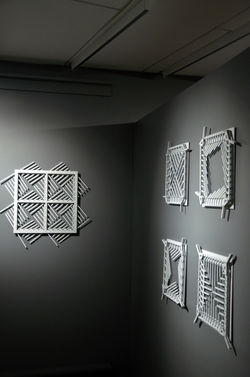 |  |
|---|---|
 |  |
 |  |
 |  |
 |  |
 |  |
 |  |
 |  |
 |  |
 |  |
 |  |
 |  |
 |  |
 |  |
 |
MOTION + eMOTION
Pointing Towards New Environments, Structures and Objects Capable of Self-transformation
“MOTION + eMOTION” was the outcome of more than a decade of experience in developing kinetic and adaptive design, ranging from architectural-scale structures to small products. This exhibition demonstrates the concept of transformability as a new design tool in architecture.
Opening June 14, 2014, the Moss Arts Center was hosting an exhibition entitled “MOTION + eMOTION” which features the transformable works of two architects: Negar Kalantar and Alireza Borhani, who make up the [trans]LAB. The retrospective show displays a cross-section of the latest design-based research projects conducted by these two scholars. To suit different needs or contexts, the works shown in the exhibit were in a variety of sizes that range from very delicate 3D printed flexible textile structures, to medium-scale adaptive building-envelope prototypes, and relatively large-scale deployable space structures. Figures illustrate the diversity of the exhibition content. Including a wide array of materials (such as plastic, leather, Plexiglas, wood and Stainless Steel), all of the works mimic the bio-responsiveness of living organisms, are interactive in nature, and engage visitors. Fascinating and impressive to watch, almost all the work pieces can capture the imaginations of spectators as the objects slide, rotate or glide as if they have life—or emotion—of their own. Alongside the support of Institute for Creativity, Arts, and Technology (ICAT), the exhibit was facilitated by the Center for the Arts at Virginia Tech. The works in the show are selected from an open call for proposals to artists throughout Virginia.